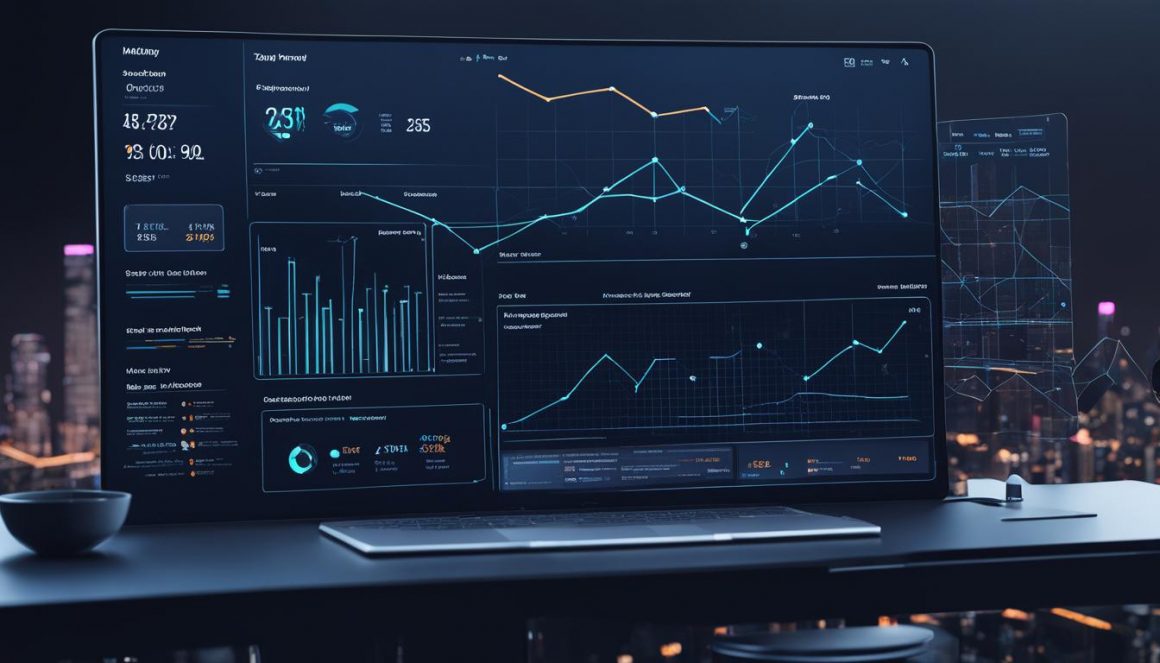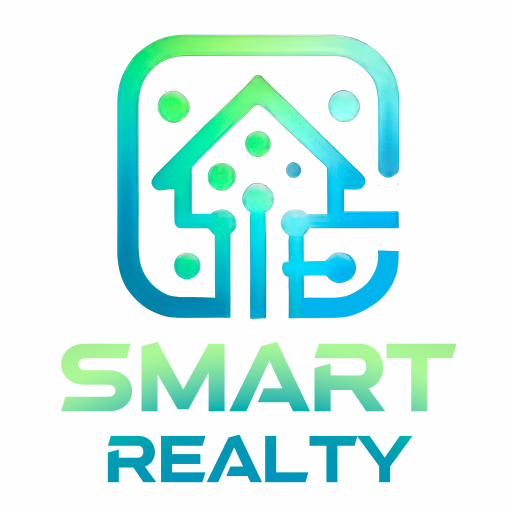In the age of technological advancements, Artificial Intelligence (AI) is revolutionizing the property management industry. With the help of sophisticated AI tools, property managers can streamline their operations, improve maintenance processes, and enhance tenant services. AI enables predictive maintenance, intelligent leasing procedures, and automation of administrative tasks, leading to more efficient property management.
Key Takeaways:
- AI in property management streamlines operations and improves efficiency.
- Predictive maintenance made possible by AI helps save costs and improve tenant satisfaction.
- AI-powered leasing assistants enhance the tenant acquisition process, improving client interaction and experience.
- Implementing AI in property management requires a substantial investment and effective change management.
- AI in modern property management software automates routine tasks, predicts maintenance needs, and provides data-driven insights.
Impact of AI in Property Management: Understanding the Fundamentals
Artificial Intelligence (AI) is transforming the property management industry by revolutionizing operations, improving decision-making processes, and enhancing overall efficiency. The implementation of AI-powered tools in property management streamlines various tasks, reduces administrative burden, and enables predictive maintenance to address potential issues before they escalate. Applying AI technology in property management ensures operational efficiency, cost savings, and improved tenant satisfaction.
AI-powered tools automate essential property management tasks such as rent collection, property listing, tenant background checks, and maintenance requests. By automating these processes, property managers can focus on more strategic aspects of their work while reducing the administrative burden. This automation not only saves time but also enhances operational efficiency, allowing property managers to provide superior tenant services.
Predictive maintenance is another critical aspect of AI in property management. By leveraging AI technology, property managers can anticipate maintenance needs, identify potential issues before they occur, and take proactive measures to prevent them. This predictive approach not only saves costs but also improves tenant satisfaction by minimizing disruptions and maintaining the overall condition of the property.
AI technology has the potential to revolutionize property management by reducing administrative burden, improving operational efficiency, and ensuring proactive maintenance measures.
Integrating AI into property management processes enables intelligent leasing procedures. AI-powered tools, such as chatbots, assist in handling leasing inquiries, scheduling property viewings, and even assisting with paperwork. This automation streamlines the tenant acquisition process, enhances client interaction, and improves overall leasing efficiency.
| Benefits of AI in Property Management | Examples |
|---|---|
| Operational Efficiency | Automation of routine tasks |
| Predictive Maintenance | Identifying maintenance needs before they escalate |
| Intelligent Leasing | Chatbots assisting with inquiries and paperwork |
| Reduced Administrative Burden | Automating rent collection and tenant background checks |
Implementing AI in Property Management
While the benefits of AI in property management are evident, implementing AI requires a substantial investment and sound technical knowledge. Property management companies need to navigate the challenges of adapting to AI-powered technologies and ensuring a smooth transition for their team. Effective change management strategies must be employed to ensure successful integration of AI in property management operations.
Companies like NexGen AI Solutions offer AI consulting services, assisting property management businesses with the implementation process. These consulting services provide valuable guidance, helping property managers leverage AI technology to its full potential and achieve optimal operational efficiency.
AI technology is transforming property management software, optimizing its functionality and providing advanced features. Through AI-powered software, property managers can automate routine tasks, predict maintenance needs, and gain data-driven insights. This integration empowers property managers to make informed decisions, efficiently communicate with tenants, and streamline financial management processes.
AI-driven property management solutions are paving the way for more efficient operations and superior tenant services. Property management companies that embrace AI technology are positioned to stay ahead of the competition and deliver unmatched services to their clients. By leveraging AI-powered tools and consulting services, property managers can optimize their operations, reduce costs, and enhance tenant satisfaction.
Intelligent Leasing: The Future of Tenant Acquisition
As the property management industry embraces technological advancements, AI-powered leasing assistants are reshaping the way tenants are acquired. These intelligent chatbots have revolutionized the tenant acquisition process by providing seamless and efficient services to both property managers and prospective tenants.
AI-powered leasing assistants handle a wide range of tasks, from handling leasing inquiries to scheduling property viewings. They are designed to provide a personalized and interactive experience, improving client interactions and overall satisfaction. By leveraging AI technology, property managers can streamline the leasing process, saving time and resources.
The Benefits of AI-Powered Leasing Assistants:
- Saves time for property managers by automating routine leasing tasks
- Provides round-the-clock availability for tenant inquiries
- Assists with scheduling property viewings, eliminating the need for manual coordination
- Improves efficiency by automating paperwork and lease agreements
Moreover, AI plays a vital role in intelligent tenant screening, ensuring that property managers make data-backed decisions in choosing their tenants. AI-powered screening tools complete comprehensive background checks, credit assessments, and analyze the likelihood of lease default. This data-driven approach reduces the risk of problematic tenants, fostering a harmonious landlord-tenant relationship.
| Benefits of AI-Powered Leasing Assistants | Benefits of Intelligent Tenant Screening |
|---|---|
| 1. Saves time for property managers by automating routine leasing tasks | 1. Reduces the risk of problematic tenants |
| 2. Provides round-the-clock availability for tenant inquiries | 2. Enhances the screening process with comprehensive background checks |
| 3. Assists with scheduling property viewings, eliminating the need for manual coordination | 3. Conducts credit assessments to evaluate tenant financial stability |
| 4. Improves efficiency by automating paperwork and lease agreements | 4. Analyzes the likelihood of lease default, minimizing financial risks for property managers |
The integration of AI-powered leasing assistants and intelligent tenant screening systems empowers property managers to make informed decisions, ensuring the selection of reliable tenants. This data-driven approach not only improves operational efficiency but also enhances the landlord-tenant relationship, leading to a more harmonious and mutually beneficial living experience.
Case Study: AI-Powered Leasing Assistant at XYZ Property Management
“Implementing an AI-powered leasing assistant at XYZ Property Management has transformed our tenant acquisition process. The chatbot handles tenant inquiries promptly and efficiently, allowing our team to focus on other high-value tasks. Additionally, the data-backed decision-making in tenant screening has significantly reduced the occurrence of lease defaults, creating a more harmonious relationship with our tenants.” – John Smith, Property Manager at XYZ Property Management


AI-powered leasing assistants combined with intelligent tenant screening tools have become an indispensable part of modern property management. By leveraging AI technology, property managers can streamline tenant acquisition processes, make data-backed decisions, and foster a harmonious landlord-tenant relationship.
The Challenge of Implementing AI
While the benefits of AI in property management are numerous, implementing AI can pose certain challenges. It requires a substantial investment, sound technical knowledge, and effective change management. However, the long-term rewards of improved efficiency, reduced costs, and increased tenant satisfaction make it a worthwhile venture.
Implementing AI in property management necessitates a substantial investment in terms of both financial resources and time. Companies must allocate funds for the acquisition of AI tools and technologies, as well as hiring or training personnel with the necessary technical expertise. Additionally, integrating AI into existing systems and processes may require significant time and effort.
Technical knowledge is another critical factor in AI implementation. Property management professionals need to have a deep understanding of AI technologies, algorithms, and data analysis. They must be able to assess the suitability of different AI solutions for their specific needs and effectively utilize the collected data to drive informed decisions.
Change management is vital to ensure a smooth transition during the implementation process. Incorporating AI into property management operations often necessitates changes in workflows, job roles, and overall organizational structure. Property managers and employees must be prepared for these changes and receive appropriate training and support.
AI Consulting Services for Successful Implementation
To navigate the challenges of AI implementation, property management companies can seek the guidance of AI consulting services like NexGen AI Solutions. These specialized consulting firms offer expertise in AI technology and can assist businesses in developing and executing robust implementation strategies.
AI consulting services provide comprehensive guidance on selecting the right AI tools and technologies based on a company’s specific requirements and budget. They help property managers identify areas where AI can deliver the greatest value and develop a roadmap for successful integration.
Furthermore, AI consulting services assist property management professionals in acquiring the necessary technical knowledge and skills through training programs and workshops. They ensure that companies stay up to date with the latest developments in AI and maximize the benefits of AI implementation.
By partnering with AI consulting firms, property management companies can overcome the challenges of AI implementation and harness the full potential of AI technology to streamline operations, improve efficiency, and deliver superior tenant services.
| Challenges of Implementing AI in Property Management | Solutions |
|---|---|
| Limited financial resources for AI investment | Seek funding options, such as grants or partnerships with AI providers |
| Lack of technical expertise among property management professionals | Invest in training programs and workshops, or collaborate with AI consulting services |
| Resistance to change from employees | Provide comprehensive change management training and support |
| Integrating AI into existing systems and processes | Develop a clear roadmap for implementation and enlist the support of AI specialists |
The Role of AI in Modern Property Management Software
Artificial Intelligence (AI) has revolutionized modern property management software, empowering property managers with advanced functionalities and improved features. With AI-powered software, routine tasks can be automated, maintenance needs can be predicted, and valuable data-driven insights can be provided. The integration of AI into property management software enhances communication efficiency, optimizes financial management, and improves maintenance and repair timelines. Additionally, AI software offers powerful analytics and reporting capabilities, enabling property managers to make informed decisions and optimize their operations.
One key benefit of AI in property management software is the automation of routine tasks. Property managers can now streamline their processes by automating time-consuming administrative tasks such as rent collection, lease renewals, and property inspections. This automation not only saves valuable time but also reduces the chances of human error, ensuring accuracy and reliability in property management operations.
Automation of Routine Tasks in Property Management
AI-powered property management software utilizes intelligent algorithms and machine learning to automate various routine tasks, including:
- Rent collection and payment processing
- Lease renewal notifications
- Work order management
- Tenant communication and inquiries
By automating these tasks, property managers can focus their time and energy on more strategic aspects of their role, such as tenant relationship building and property growth strategies.


Predictive maintenance is another critical aspect of AI in property management software. By analyzing historical data and using machine learning algorithms, AI software can predict potential maintenance issues before they occur. This proactive approach helps property managers allocate resources efficiently, reduce maintenance costs, and ensure smoother operation of their properties.
Predictive Maintenance in Property Management
AI-powered property management software predicts maintenance needs by:
- Monitoring property data, including energy consumption, equipment performance, and environmental conditions
- Identifying patterns and anomalies in data that indicate potential maintenance issues
- Generating automated maintenance alerts and work order notifications
This data-driven approach not only saves time and money but also improves tenant satisfaction by minimizing unexpected disruptions.
The integration of AI into property management software provides valuable data-driven insights that enable property managers to make informed decisions. AI software can analyze large sets of data, identify trends, and generate actionable insights for property managers.
Data-Driven Insights in Property Management
AI-powered property management software offers data-driven insights by:
“The idea is that AI can analyze vast amounts of data and identify trends that may not be immediately apparent to humans.” – Angela Thompson, Property Management Expert
Property managers can leverage these insights to:
- Optimize rent pricing based on market trends and demand
- Identify cost-saving opportunities through energy consumption analysis
- Enhance tenant satisfaction by identifying preferred amenities and services
- Improve property maintenance and repair timelines through predictive analytics
| Property Management Software Benefits | AI-powered Property Management Software Benefits |
|---|---|
| Efficient communication | Efficient communication |
| Financial management optimization | Financial management optimization |
| Maintenance and repair timelines improvement | Maintenance and repair timelines improvement |
| No data-driven insights | Valuable data-driven insights for informed decision-making |
Conclusion
The adoption of AI-driven property management solutions has brought about a revolutionary change in the industry. By leveraging AI technology, property managers can streamline their operations, optimize maintenance processes, and deliver superior tenant services. This has resulted in increased operational efficiency, significant cost savings, and improved tenant satisfaction.
Property management companies that embrace AI-driven solutions gain a competitive edge by providing unmatched services to their clients. The implementation of AI offers the potential for efficient operations, enabling property managers to handle administrative tasks more effectively while freeing up time for more strategic endeavors.
Furthermore, AI enables predictive maintenance, allowing property managers to identify and address maintenance needs proactively. By leveraging data-backed insights, property managers can anticipate potential issues, reduce downtime, and ensure the seamless running of their properties. This proactive approach not only improves tenant satisfaction but also helps to maximize asset value.
In order to harness the full potential of AI-driven property management, property management companies can seek guidance from AI consulting services like NexGen AI Solutions. With their expertise, companies can navigate the implementation process and effectively integrate AI into their operations, thereby elevating their property management practices to new heights.
FAQ
How does AI streamline property management operations?
AI streamlines property management operations by automating tasks such as rent collection, property listing, tenant background checks, and maintenance requests. It also enables predictive maintenance, allowing property managers to address potential issues before they arise.
What is the role of AI in tenant acquisition?
AI plays a critical role in tenant acquisition by using AI-powered leasing assistants, or chatbots, to handle leasing inquiries, schedule property viewings, and assist with paperwork. AI also facilitates intelligent tenant screening through comprehensive background checks and credit assessments.
What are the challenges of implementing AI in property management?
Implementing AI in property management can be challenging due to the substantial investment required, the need for technical knowledge, and effective change management.
How does AI impact property management software?
AI enhances property management software by automating routine tasks, predicting maintenance needs, and providing data-driven insights. It enables efficient communication, optimized financial management, and improved maintenance and repair timelines.
What are the benefits of AI in property management?
AI in property management leads to increased operational efficiency, cost savings, and improved tenant satisfaction. It streamlines operations, optimizes maintenance processes, and enhances tenant services.
Source Links
- https://www.linkedin.com/pulse/revolutionizing-property-management-unveiling-voi9f?trk=article-ssr-frontend-pulse_more-articles_related-content-card
- https://onrapp.com/role-of-ai-in-modern-property-management-software/
- https://www.chetu.com/blogs/real-estate/ai-technologies-streamline-property-management.php

